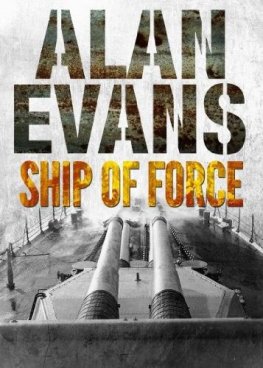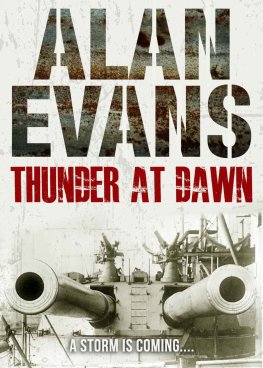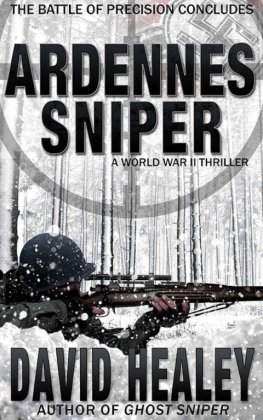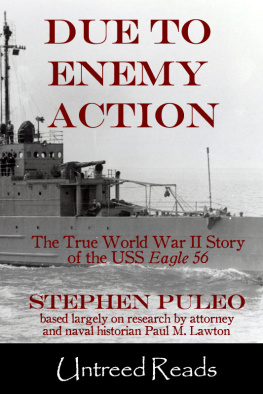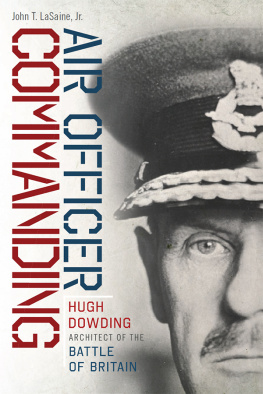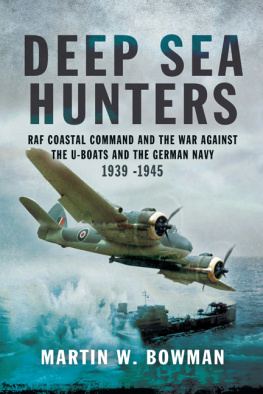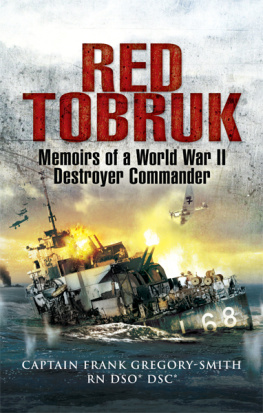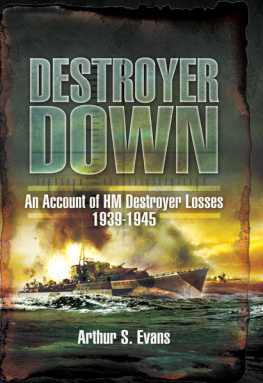Ship of Force
by
Alan Evans
If I listed the names of all the people who helped me with this book, in Belgium, Dunkirk and Britain, it would fill a page or two. But my thanks to all of them.
This is a work of fiction, though set in the framework of events at the time. Any resemblance of any character to a real person, living or dead, is coincidental. In particular there was never a Dunkerque Squadron as portrayed here, nor such a Commodore.
He was not tall, and was slight of build, thin-faced. His name was David Cochrane Smith, he wore the uniform of a Commander, Royal Navy and in that summer of 1917 he was just thirty years old. He walked across Horse Guards Parade towards the Admiralty to be told his fate. He had seen action too often and knew he was not a brave man, but while he could not deny his fear he could hide it as he did now. He knew a lot of his faults. He was self-critical but he could usually smile at himself, if wryly. He could not smile now. He wanted one thing in all the world and that was a command and he would fight for it because he was a fighter. But he was afraid.
* * *
Rear-Admiral Braddock stood at the window of his office that looked out over the Horse Guards and watched Smith until he disappeared into the building. Braddock waited at the window as the minutes ticked away. He was square and solid with a pointed black beard and thick, black hair but after three years of war both hair and beard were flecked with grey. He had entered the Navy in 1862 as a boy of twelve and built a career on courage, common sense and dedication to his profession, virtues like the man himself, solid, practical. He was a good officer, a good example of a type, not a man who got himself talked about in terms heroic or scandalous, sturdily respectable, not brilliant. He knew that. And thought the officer about to arrive was very different.
He turned and scowled as the knock came at the door and Smith entered, cap under arm. Braddock nodded. Sit down.
Thank you, sir. Smith sat stiffly on the straight-backed chair as Braddock stared at him frankly. Smiths fair hair showed the mark of the cap, an indented circle around his head. Not a handsome face. Not impressive. But three months before, in command of H.M.S. Thunder, an elderly armoured cruiser, Smith had fought two marauding German cruisers off the coast of Chile. And sunk them. The action had been bloody; Thunder had lost a third of her complement in killed or wounded. Smith had also previously sunk two German colliers, tenders to the cruisers but masquerading as neutrals. One of them he had blown up in a neutral port and the shock-waves of that explosion still shuddered through the diplomatic world and shook the already shaky foundations of Smiths career.
Braddock stared into the pale blue eyes that met his, seemingly without emotion, and thought, Youd never think it to look at the feller.
His wide desk held but one file and that was closed. Braddock knew its contents by heart and would not refer to it again. The spectacles he hated were hidden in a drawer; he could see his man well enough and could recite the details of Smiths career and his background. Brought up in a Norfolk village by a retired Chief Petty Officer and his wife who ran the village shop. There were many who wondered how a boy from that background got into Britannia as a cadet. Braddock himself had wondered. But now he knew more about Smith than Smith did himself. And could not tell him.
Braddock said abruptly, I sent you to the Pacific to get you out of trouble. There had been a woman, not the first by any means but that affaire had bordered on the scandalous and could have wrecked Smiths career. Braddock said nothing of that, but: You did very well out there.
Thank you, sir.
That is the opinion of the public at large. A number of your superiors are not so enthusiastic and think you took enormous risks that were only justified by later events. They think youre eccentric, hare-brained and plain lucky. A wild man. He eyed Smith. So youll see why there were difficulties about your next appointment.
There was the slightest emphasis on the past tense and Smith said quickly, hopefully, Yes, sir?
Yes. But there was a suggestion that an anti-submarine flotilla be formed. Braddock said grimly, Are you aware that the U-boats are winning the war at sea? That if they continue to sink ships at their present rate this country will be starved into submission?
Smith hesitated. I didnt know it was that bad, sir.
Well, it is. But keep your mouth shut. What do you think of an anti-submarine flotilla?
It might help, sir.
Braddocks thick eyebrows lifted. Didnt Smith want the bloody job? You dont sound too confident.
I think it can only supply part of the answer. I think Smith stopped.
Braddock prompted him impatiently, What do you think?
That convoys are the answer. They worked in other wars, and in some waters in this one.
The argument goes that a modern war and the U-boat impose new conditions.
The beef convoy is working, sir. Smith said it flatly, stating a fact. The beef convoy ran between neutral Holland and England.
Braddock nodded slowly. I agree. But for now: an antisubmarine flotilla its going to be. The suggestion comes from Commodore Trist who commands the Dunkerque Squadron, and it has been approved. He proposes a flotilla of destroyers and a ship of force as flagship. I quote him verbatim. The ships to be allocated from his command as available and the flotilla still to be under his overall command. He finally opened the file that lay on the desk but only to take an envelope from it and hand it to Smith. Your appointment.
Smith took it. Thank you, sir. Im grateful.
Rubbish! Braddock rumbled. He stared down at his hands spread big on the desk, then squinted up at Smith and said quietly, Wait and see what its like. But I pushed for you to get it because I think you will be able to do something with it. And then he hurried on, not giving Smith a chance to speak: Another thing. Garrick and a Leading Seaman Buckley asked to serve with you again.
Smith blinked. They had served in Thunder in the Pacific, Garrick as First Lieutenant. Their asking to serve with Smith again was a compliment and he did not know what he had done to deserve it.
Braddock said, Their request has been granted. Garrick gets his half-stripe and hes to have a command under you.
Garrick a Lieutenant-Commander now! Smith said, Thats grand, sir. He was pleased and it showed.
Braddock shrugged. You should have had promotion yourself, but as I said, youre not everybodys favourite officer, not anybodys favourite officer. You stepped on too many toes in the Pacific. He asked, Any questions?
No, sir.
Braddock could see Smith was eager to be away, excited at a new command even possibly relieved? Had he been in doubt that he would get a command? Braddock believed in this young man and that he should be employed. He said, Trist is over here for a conference and wants to see you. Theres a messenger outside to take you along. He stood up and turned to the window again. He had a lot to think about and he thought best on his feet, but as Smith reached the door Braddock called in a near bellow, Smith!
Sir?
Braddock did not turn from the window. He said, If you ever need help you know where to find me.
Thank you, sir.
The door closed. Braddock went on, but muttering to himself with bitter resignation, Because they wont let me out of this bloody office now.
He was too old, and too valuable where he was.
* * *
Smith followed the stooped and grizzled messenger as that pensioner creaked along the corridors of the Admiralty, but his mind was elsewhere. He

